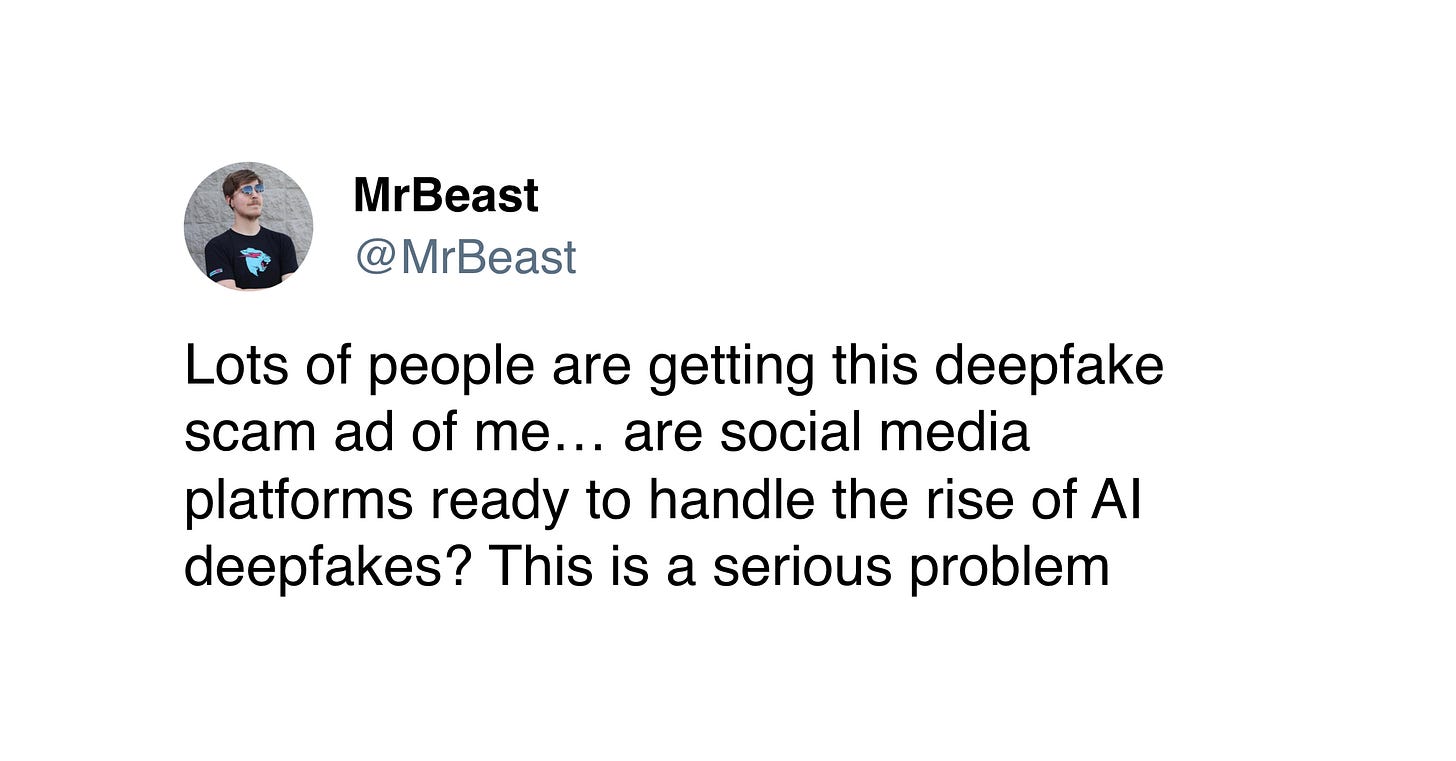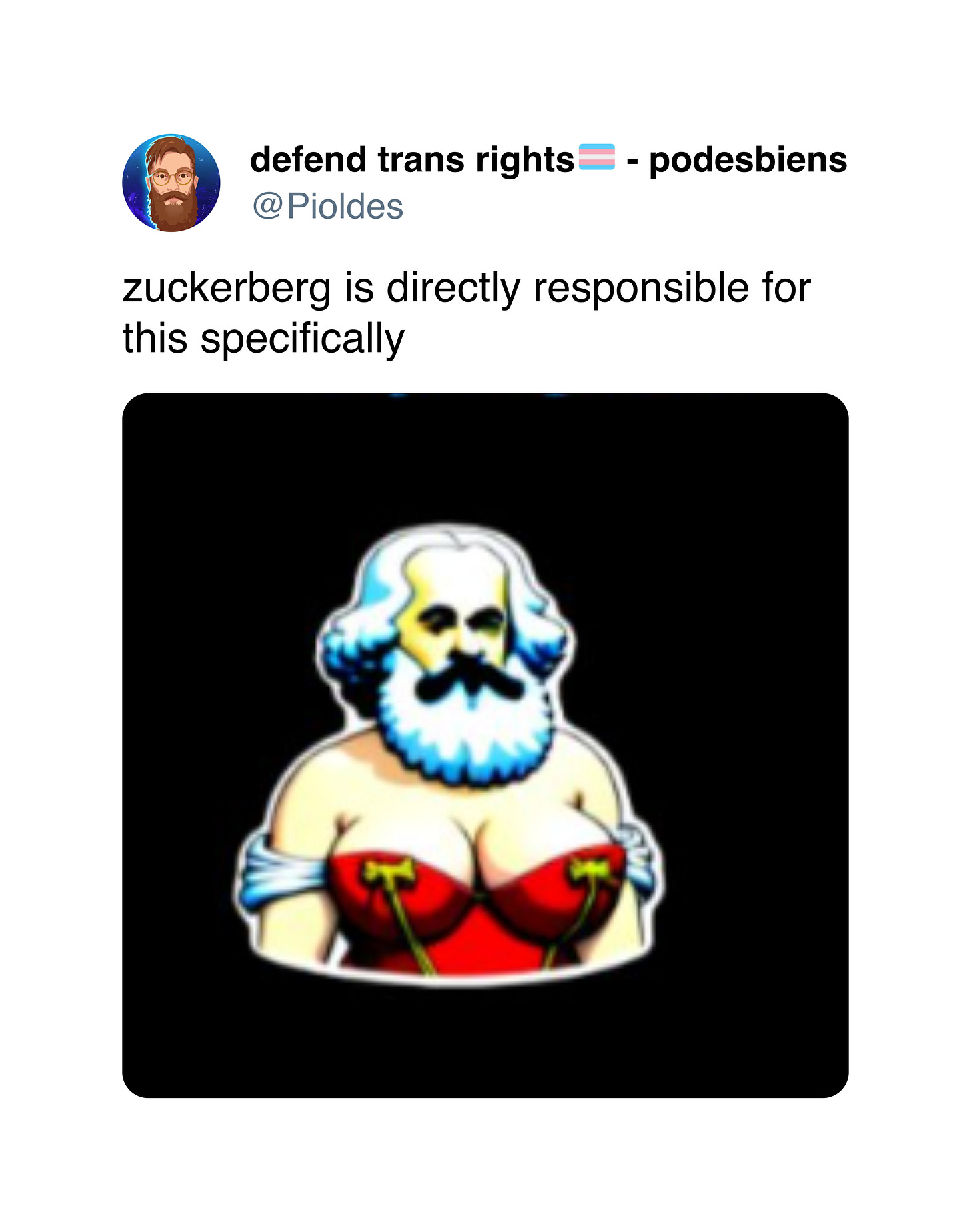AI Roundup 035: Me or your lying eyes
October 6, 2023.
Me or your lying eyes
Deepfakes have been around for a while, but advancements in generative AI have opened the floodgates to creating them at scale.
What to watch:
MrBeast asks whether social platforms are ready for the coming misinformation, as fraudulent ads impersonating him (and other celebrities, like Tom Hanks) go viral.
Ahead of Slovakia’s elections, we’re seeing a spike in deepfaked voice messages and videos.
And it’s not just Slovakia: political leaders in at least 16 countries have used deepfake tech in the past year, including two examples from the US.
Elsewhere in AI anxiety:
LLM hallucinations are slowly degrading web search results.
AI is replacing customer service jobs around the world.
And researchers demonstrate breaking AI-image watermarks, making it that much harder to flag AI content.
This is why we can't have nice things
Microsoft rolled out DALL-E 3 for Bing Chat and Bing Image Creator users this week. Of course, the first thing people did was abuse it.
What to watch:
Some 4chan users are running a coordinated campaign to flood the internet with racist images with the image generation tool.
Others have been making images of Spongebob doing 9/11, with images of planes and the twin towers.
And on the Meta side, users are finding its AI-powered sticker generator spits out child soldiers, nude politicans, and plenty of other deranged content.
Elsewhere in the FAANG free-for-all:
Google announces Assistant with Bard, a mobile assistant with generative AI capabilities.
Meta rolls out generative AI features for advertisers to edit images and rewrite ad copy.
And Spotify's codebase hints that the company is working on prompt-based playlist creation.
When the chips are down
OpenAI is reportedly exploring making its own AI chips, and may even have a potential acquisition target.
Why it matters:
As we’ve discussed, GPUs are OpenAI’s biggest bottleneck right now.
Altman seems to be taking an Apple-style approach of owning more of the stack to avoid supply-chain issues.
And it tells us that Altman likely believes the GPU shortage is going to continue for the foreseeable future.
More from OpenAI:
An interview with OpenAI CTO Mira Murati on regulation, competition, safety, and more.
LinkedIn adds OpenAI-powered features for recruiters and marketers.
And a look at OpenAI’s arguments in its copyright infringement defense.
Elsewhere in AI hardware:
VCs are using the promise of GPU access to close more investment deals.
Rewind launched its Rewind Pendant, a device to capture what you say and hear and makes it easily searchable.
And Humane AI debuted the Ai Pin at Paris Fashion Week - we're not 100% sure of what it does, but it definitely generates a lot of buzzwords.
Things happen
The NSA announces an AI security center. Meta is paying millions to celebrities for their AI chatbots. Gaia-1, a generative world model for autonomous driving. Product strategy in the age of AI. JPMorgan CEO says our kids will work 3.5 days a week thanks to AI. Anti-piracy group takes down "Books3" training dataset. Canva's new AI automation tools, and its $200M training data fund. The DOD is urging companies to share insights on their AI architectures. Perplexity's new LLM API. A look at AGI house, an AI hacker house in the Bay Area. The synthetic social network. AI content is contributing to a decline in fact-checking sites. Meta used publicly available Facebook and Instagram content to train its AI.
Last week’s roundup
AI Roundup 034: Meta Connect
Meta's Connect event was this week - a conference originally about VR - and the company showcased a whole bunch of AI announcements.








Feels like things are about to get insanely wild with deepfakes, especially as election season begins to creep closer in the US. We're going to see things we can't imagine today in just a short time.
I think we might see another Arab Spring moment, where everyone thinks something is going to happen due to technology, but something else happens instead.